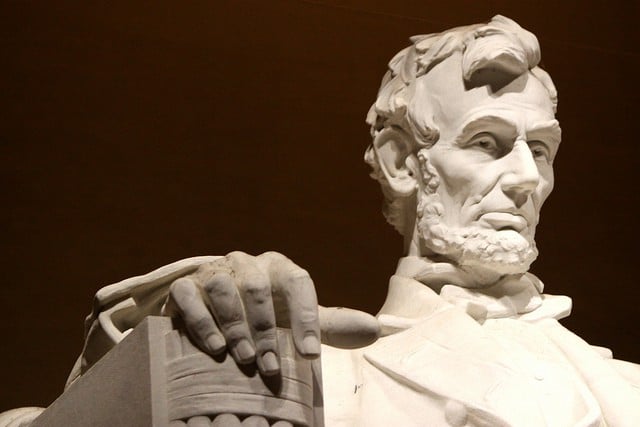Donald Trump. Income inequality. Government shutdowns. School shootings. The refugee crisis. Immigration reform. Declining wages. Health care costs. Campaign finance. Congressional leadership. Donald Trump. Outsourcing. Culture wars. Lobbyists. Ferguson. Homelessness. Failing schools. Crony capitalism. Voter apathy. Media bias. Racial Inequality. Did I mention Donald Trump?
What’s your reaction to this list?
I know mine: gratitude.
Gratitude?
I know: these things are problematic. Everyone in the United States is tired of the ceaseless political bickering, the childish infighting, the seemingly insurmountable partisan divisions. For many Americans, in fact, politics in the United States seems hopeless, a contest between those who won’t stop shouting and those who won’t start listening. Our greatest challenge should be to address the difficulties facing our country. Instead, we are struggling just to bring people to the table. To add to our desolation, this election season promises only more of the same, and for twelve long months.
So why do I react to all of this with gratitude? Because it is the only way forward.
Two dynamics define our current political culture. But we’re only talking about one of them.
First, as we have said, our political disillusionment has itself become the story. That is undeniable. Approval ratings for all three branches of government — and many people serving within them — are low. From this perspective, Pope Francis’ approval rating of 60% is truly amazing.
But second, in spite of all the problems with our politics, Americans still believe in the system. Incredibly, Americans continue to support democracy, civil rights and the Constitution. Indeed, when we complain about U.S. politics, we don’t say “This has been a failure. Let’s start over from scratch.” Rather, we complain that we are failing to live up to our own standards.
And this, kind reader, is a good sign. In spite of all of the failings of our political system, we continue to believe in it. We believe that it can be a good thing, and so we think it’s worth taking a chance on. Most of what we say about politics is negative. But we complain and scream and pull our hair out because we think that politics is important, and we can’t give up on it. Our frustration is a clear sign that politics still matters to us.
So what does this all mean? It means that we have something very good going for us, and we need to embrace that good. We are balancing a great love of America with a great antipathy for its current condition. This is an impressive balancing act, but we run the risk of letting our despair swallow our confidence. That’s why I propose gratitude as the best attitude toward our situation. Why? Allow me to offer a few reasons:
1. Gratitude sniffs out the good. At its simplest, gratitude means giving thanks. And we should give thanks by first recalling all that is good about America. We are in fact thankful for many things in our country, and our frustration, disappointment and apathy need not be the only emotions we stew in. Let us take stock of all that we have accomplished in the past, what we are doing now, what we have the potential to do. We know what’s going wrong with this country. But what’s going right?
2. Gratitude is humble. Humility means knowing that much that is good in our lives is a gift. Generations before us have fought for liberty, abolished slavery, emancipated women and racial minorities. These come to us as something given to us, not as something we have earned. Yet now that we have them, we must treasure them. When Frederick Douglass spoke against slavery, he argued that the U.S. political tradition has instilled in us a belief that liberty is precious, and that it must be treasured in its fullness. Thus the “glorious liberty document” that is the Constitution must be extended to African-Americans as well.
3. Gratitude is hopeful. Giving thanks helps us to see our strengths. If we are going to move forward, it will be in cultivating our strengths, not in dwelling on our weaknesses. When we know what’s going right in our world, we can hope to build upon it. We can hope to endure present troubles. There was little reason for the American people to believe in 1863 that the U.S. would survive the Civil War, but Abraham Lincoln hoped otherwise. Although it would cost him his life, Lincoln’s hope won the day.

Lincoln Memorial
4. Gratitude is realistic. We can soberly survey our situation with a view toward examining what we need to do. We cannot solve all of the world’s problems. Our political beliefs are valuable, but not infallible. Yet we believe that there are things worth doing and that what we do matters around the world. The U.S. could easily have walked away from the devastation of post-war Europe, for instance. Indeed, perhaps the U.S. should have walked away, given the opposition of the U.S.S.R. to American involvement in post-war reconstruction. But the U.S. instead devised plans that led to a swift European recovery, including aid for formerly hostile Germany.
5. Gratitude will change the conversation. Indeed, gratitude is not just about the big structures of politics that we often find so overwhelming and alienating — it is about our daily lives as individuals. We can use it to reclaim and humanize politics as we experience it. With it we can see other people as fellow citizens, not as ideological opponents. We can hold our elected officials responsible as stewards of the common good, not competitors in high-stakes robbery. And we can see political beliefs and partisan views as proposals for everyone’s benefit, not as dogmatic assertions about what would benefit ourselves.
* * *
We all know that our politics won’t change overnight, and we shouldn’t pretend that they will. But gratitude will open our eyes to things we don’t realize that we’re seeing. How often do we bemoan the troubles of the world around us, yet enjoy wonderful and meaningful relationships with people in our own slice of the world? Maybe Democrats and Republicans can’t get along on the Hill, but we get along just fine, throughout the rest of the country. Many of us have wonderful friendships with people who are politically our polar opposites. So why do we let politics become so divisive and unsavory on the national stage? Let’s change the conversation, and let’s start with giving thanks for all that is good.
Doesn’t that sound like what America needs right now? Gratitude is not the solution to our problems, but it’s a helpful antidote to despair, cynicism, and paralysis. It’s a start, and one we desperately need.
-//-
Both images, “Abraham Lincoln Memorial” by Gage Skidmore, available here on Flickr.


